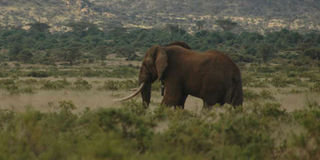Matriarch jumbo’s amazing journeys across Kenya

Matt the bull elephant at Samburu National Park, in 2011. It is part of the herd that features in the movie "The Elephant Queen". PHOTO | COURTESY
What you need to know:
- While the couple had always wanted to tell an elephant story, they also needed to show how elephants are important in the great circle of life.
- It will also be translated into Swahili and Maa for a countrywide tour of mobile cinema, with Save the Elephant.
The award-winning, critically acclaimed film directed by Victoria Stone and Mark Deeble, "The Elephant Queen", is touching down in Kenya starting with a broadcast on television this Easter Sunday.
The film premiered at Sundance Film Festival on January 27, 2019 and has won the Biodiversity Award in United Nations/CITES World Wildlife Day Film Showcase, Best Cinematography DOC NYC, and Cinema For Peace’s Best Environmental Film.
"The Elephant Queen" follows Athena, a huge tusker, who has to protect and lead her herd as they navigate life in the savannahs of Tsavo and Amboseli.
She must ensure survival for her daughter, Princess, and the rest of the herd after they are forced to leave their waterhole.
Mark and Victoria have been filming the wild for over 30 years. With Mark’s background as a zoologist, his knowledge has enabled them to interpret animal stories and to bring them out in beautifully connecting tales. Elephants are keystone species in an ecosystem.
While the couple had always wanted to tell an elephant story, they also needed to show how elephants are important in the great circle of life.
PERFECT NARRATOR
Whenever we talk about elephants, it is easier to just think “big, lumbering, grey animals”, but there is an incredible spiral of life that relies on them: making water holes and supporting lives of creatures like fish and frogs, creating pathways for wildlife, giving food to other species, and improving the landscape of their habitats though their dung, and so much more.
“It was also about all the other animals and the ecosystem that an elephant shares its world with; they don’t live in isolation. We shot from angle of the tiny animals, at the elephant’s toe nail height, as a way of making the film more dynamic because they are just as important,” says Victoria.
Mark and Victoria wanted their film to loosely capture three films when starting out: "March of The Penguins" (because of the genre), "The Lion King" (because of the circle of life theme and the light touch the film sometimes adopted), and "Shrek" (there are many shocking scenes that will get you going, “Oh my goodness! Reall y?”).
It almost seems like you’re watching an animation rather than a documentary at times.
British film actor Chiwetel Ejiofor, who plays Scar in "The Lion King", gives a really rich storytelling voice to the film as the narrator.
“We wanted someone who loved the film and was empathetic with the subject. With his deep voice and the way, Chiwetel captured this,” says Victoria.
ECOSYSTEM
In the end it’s an emotional rollercoaster, not something you would associate with a documentary.
It is funny, exciting, sombre, challenging and will keep you rooting or hoping things don’t get any worse for these majestic animals.
There are even times when you cannot help but be in awe of how elephants live, sort of what human society ideally should be, with reverence, empathy and fairness.
From a simple story arc that wanted to explore what would happen if elephants were removed from the ecosystem, Mark and Victoria gathered a small team of five and spent four years shooting the film in Tsavo and Amboseli national parks.
“We let the wild talk to us as we see things. We’re also doing some rough editing as we go along to make sure the story is working, and we’re building the sequence to fit into the frame of that arc.
When you’re filming, half your mind is on the story while the other one is on the technical issues like having enough batteries or card space. When you take your eye off the viewfinder is when you get to take in the magnitude of what you’ve just experienced. There isn’t much room for emotions then,” Mark shares.
STATE BACKING
A lot of films get shot here but do not get to make the premieres or publicity locally that would show what the outcome was. Mark and Victoria wanted to change that narrative.
“The screening in Kenya has always been the ultimate moment for us because this is one of the most amazing places with the most amazing species of animals, and it was shot here.
“When the CS Information and Communication Technology (ICT), Joe Mucheru, came to the New York premiere of the film in September; it was an incredible honour for us. He was determined that it had to have the largest viewing possible back here; I believe he was blown away by it. He rallied support to make sure it gets the widest viewership possible here,” explains Victoria.
A red carpet premiere for the film was to be held at Nairobi Cinema, with First Lady Margaret Kenyatta being the guest of honour, on March 21, but had to be cancelled due to the coronavirus pandemic.
So in a deal between the filmmakers and ICT Ministry, the film will be screened on Citizen TV on Sunday at 5pm.
It will also be translated into Swahili and Maa for a countrywide tour of mobile cinema, with Save the Elephant.
Wildlife Direct will launch a big outreach, with the focus being on elephant.co.ke, where 28 downloadable children’s learn-to-read books, developed in partnership with KICD will be available.
There will also be downloadable school plays and costume ideas for different age groups to replicate different themes from the movie.





